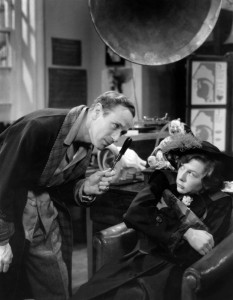 It’s a fun bit of trivia that George Bernard Shaw is the only person to have won a Nobel Prize for Literature and an Academy Award. He secured the latter for a truly brilliant adaptation of his own stage play: 1938’s Pygmalion.
It’s a fun bit of trivia that George Bernard Shaw is the only person to have won a Nobel Prize for Literature and an Academy Award. He secured the latter for a truly brilliant adaptation of his own stage play: 1938’s Pygmalion.
The plot: Eliza Doolittle is a poor Covent Garden flower girl (Wendy Hiller) with a lower-class accent thicker than a London fog. She is taken on as an experimental subject by imperious, brilliant and eccentric language expert Professor Henry Higgins (Leslie Howard), who intends to pass off this “squashed cabbage leaf” and “incarnate insult to the English language” as a fine, upper class lady. Higgins doesn’t do this out of kindness, but because he wants to show off his abilities as a language and etiquette coach and along the way to win a bet with his friend Colonel Pickering (Scott Sunderland, in an appropriately warm portrayal of upper-class decency). The result is abject hilarity underlain by Shaw’s caustic observations on social class hierarchies. There is also, infamously, a strange romance which resolves in a fashion that is still much debated.
There is so much to praise in this movie! Shaw’s peerless source material is only the beginning of the joy for audiences. Co-Directors Leslie Howard and Anthony Asquith give a clinic in how to open up a play with the possibilities of film. Howard is also an antic marvel on screen, consistently watchable and funny without making Higgins more sympathetic than he should be.
But as good as Howard is, and he’s very good, the then-unknown Wendy Hiller is a revelation. She had garnered raves for her Eliza on stage and it’s easy to see why. She wrings all the laughs out of the part but also portrays heart-touching vulnerability and fiery spirit. She later won an acting Oscar for Separate Tables but this is her performance of a lifetime and ranks with the best 20th century turns by a British film actress.
This is also a good-looking film, especially if you treat yourself to the restored Criterion Collection version. Cinematographer Harry Stradling Jr. had a fine eye for London life from its poshest to grimiest bits, and he was aided by a soon-to-be famous film editor named David Lean.
Pygmalion is near-perfect cinematic entertainment that remains tremendously appealing today. And though it doesn’t sound or look as good as The Criterion Collection version, you can watch a not bad copy of this public domain film for free at The Internet Archive.
SPOLIER ALERT: Stop reading here if you haven’t seen the film. Continue reading “Weekend Film Recommendation: Pygmalion”